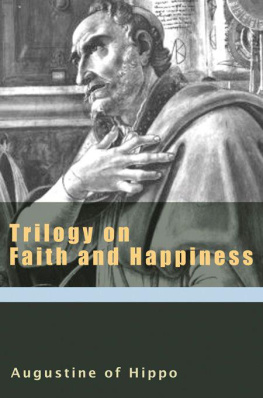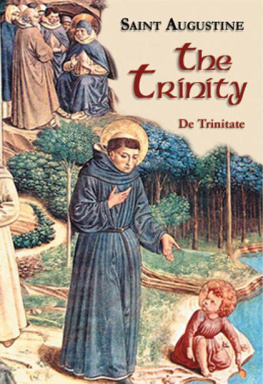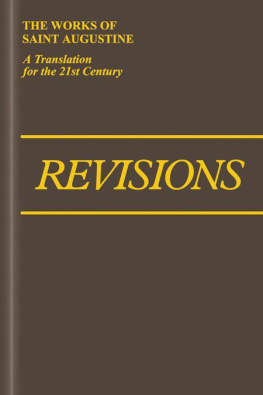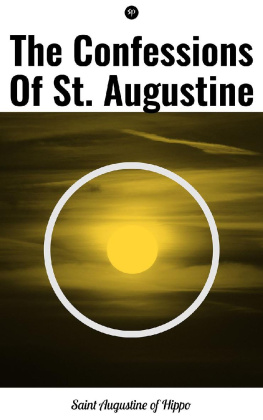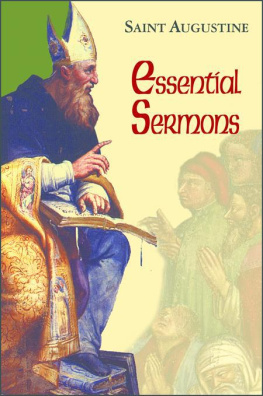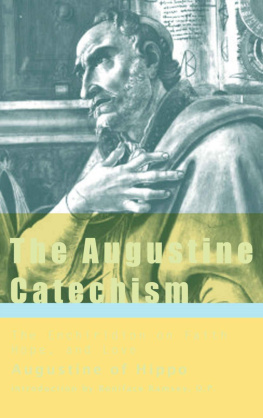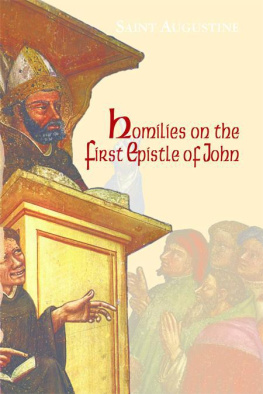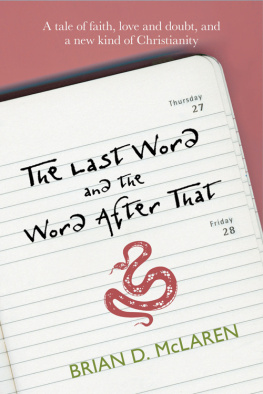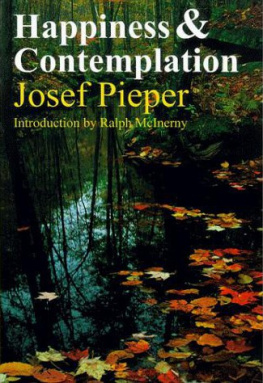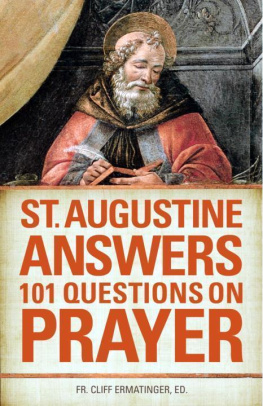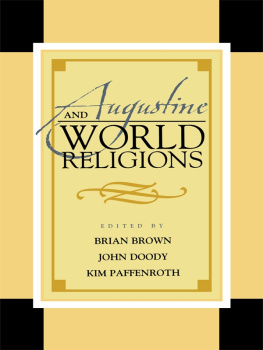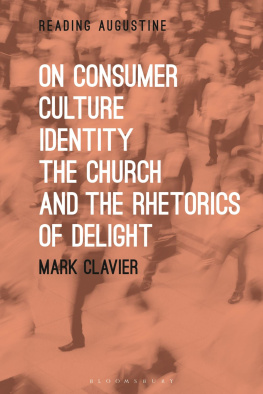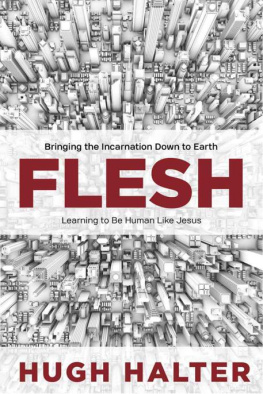Augustine of Hippo - Trilogy on Faith and Happiness
Here you can read online Augustine of Hippo - Trilogy on Faith and Happiness full text of the book (entire story) in english for free. Download pdf and epub, get meaning, cover and reviews about this ebook. year: 2010, publisher: New City Press NY
Romance novel
Science fiction
Adventure
Detective
Science
History
Home and family
Prose
Art
Politics
Computer
Non-fiction
Religion
Business
Children
Humor
Choose a favorite category and find really read worthwhile books. Enjoy immersion in the world of imagination, feel the emotions of the characters or learn something new for yourself, make an fascinating discovery.
- Book:Trilogy on Faith and Happiness
- Author:
- Publisher:New City Press NY
(first published August 10th 2010) - Genre:
- Year:2010
- Rating:3 / 5
- Favourites:Add to favourites
- Your mark:
- 60
- 1
- 2
- 3
- 4
- 5
Trilogy on Faith and Happiness: summary, description and annotation
We offer to read an annotation, description, summary or preface (depends on what the author of the book "Trilogy on Faith and Happiness" wrote himself). If you haven't found the necessary information about the book — write in the comments, we will try to find it.
Trilogy on Faith and Happiness — read online for free the complete book (whole text) full work
Below is the text of the book, divided by pages. System saving the place of the last page read, allows you to conveniently read the book "Trilogy on Faith and Happiness" online for free, without having to search again every time where you left off. Put a bookmark, and you can go to the page where you finished reading at any time.
Font size:
Interval:
Bookmark:
Trilogy
on Faith
and Happiness
Augustine of Hippo
Translated by
Roland J. Teske, S.J.
Michael G. Campbell, O.S.A.
and Ray Kearney
Introductions and notes by
Michael Fiedrowicz
and Roland Teske, S.J.
Edited by
Boniface Ramsey
New City Press
Hyde Park, New York
The Augustine Series
Selected writings from The Works of Saint Augustine
A Translation for the 21st Century
Volume VI
Trilogy on Faith and Happiness
Published in the United States by New City Press
202 Comforter Blvd., Hyde Park, NY 12538
www.newcitypress.com
2010 Augustinian Heritage Institute
Cover design by Durva Correia
Library of Congress Cataloging-in-Publication Data:
Augustine, Saint, Bishop of Hippo.
[Selections. English. 2010]
Trilogy on faith and happiness / Augustine of Hippo ; edited by Boniface Ramsey.
p. cm. (The Augustine series ; v. 6)
Includes bibliographical references.
ISBN 978-1-56548-359-0 (pbk. : alk. paper) 1. FaithEarly works to 1800. 2. HappinessReligious aspectsChristianityEarly works to 1800. I. Ramsey, Boniface. II. Title.
BR65.A52E6 2010d
234.23dc22 2010024753
Printed in the United States of America
Preface
The three treatises brought together in this volume, The Happy Life , The Advantage of Believing, and Faith in the Unseen, are a sampling from the early works of Augustine, written before he achieved the theological confidence that a careful study of the epistles of the Apostle Paul was eventually to give him.
The Happy Life was composed during the autumn of 386, after Augustine had decided upon being baptized (which took place at the following years Easter Vigil) and while he was staying at a friends villa at Cassiciacum, not far from Milan. Here he spent several months in the midst of a close-knit community of family and friends, including his mother Monica, his son Adeodatus, his brother Navigius, two cousins, Lastidianus and Rusticus, two students, Licentius and Trygetius, and his close friend Alypius. Augustine reports on the lengthy discussion or dialogue which considered the question of the pursuit of happiness. Happiness, he notes, is linked to the desire for good things that can never be lost. Monica plays a key and forceful role that is hardly in keeping with her limited educational background, and concludes that unhappiness is nothing but neediness. Augustine identifies happiness with the possession of wisdom, which is none other than the Son of God. The Happy Life is notable for, among other things, its very sparing use of scripture.
The second work in chronological order is The Advantage of Believing , written immediately after Augustines unexpected ordination to the priesthood in Hippo in 391. Augustine dedicated the work to an old friend, Honoratus, with whom he had been heavily involved in the Manichean movement. Here Augustine defends the Catholic interpretation of the Bible and finds proof of the Churchs authenticity in its reputation, the number of its followers and its diffusion throughout the world. In the face of the Manichean attack on the supposed credulousness of Christians, Augustine uses the example of friendship and familial relations to show how faith is indispensable in everyday life. He also discusses miracles and notes that, if they were more frequent, they would cease to amaze and astonish us, although in fact everyday existence is replete with miracles associated with the annual seasons. Lastly, Augustine insists that religion does not belong exclusively to the intellectually elite, as is indicated by the uneducated masses of men and women of many nations who believe and preach it.
The authenticity of the last work, Faith in the Unseen , has been debated by scholars because it does not appear either in Augustines Revisions or in the list of Augustines works assembled by his biographer Possidius and known as the Indiculus . Nevertheless, a strong argument for its authenticity is found in Letter 231 (7), addressed to Augustines friend Darius, where a work with the same title is mentioned. This treatise must have been composed soon after 399. Here too Augustine speaks of the indispensable role of faith in human life. Human beings must by necessity believe in many things which cannot be seen, in particular the trust and good will of friends and, even more so, of spouses. Those who allege that faith in Christ lacks proof are greatly mistaken, as seen in the fulfillment of Old Testament prophecy, while the truth of the Churchs teachings is evidenced by the fact that it is spread throughout the world.
These three works bear witness to a writer who moves step-by-step through his arguments in a way that is intentionally easy for his reader to follow, and all three give special weight to the rational pursuit of truth.
Daniel E. Doyle, OSA
Villanova University
The Happy Life
Translation, introduction and notes
by Roland J. Teske, S.J.
Introduction
The Happy Life is one of the first two writings of Augustine to have survived. He wrote it in the fall of 386 at the villa of his friend, Verecundus, a Milanese teacher of grammar, at Cassiciacum near Milan, in sight of the Alps. During the previous summer Augustine had discovered the books of the Platonists and achieved the insight that allowed him to think of God and the soul as non-bodily substances. Up until that point his thinking was dominated by the prevalent Stoic corporealism of the West, which held that whatever is not a body is not real. Without the ability to conceive of a non-bodily substance Augustine had been unable to extricate himself from the Manichean challenges to Catholic Christianity about the source of evil in the world. For the Manicheans shared the corporealism of the Stoa and concluded that, if evil is to be real, it must be a bodily substance. Augustine had spent over nine years as a hearer in the Manichean sect, and his exposure to the books of the Platonists, that is, the Enneads of Plotinus and possibly some works of Porphyry, provided him with the intellectual tools to free himself definitively from the snares of the Manicheans and to begin to develop a spiritualist metaphysics that provided him with a much more adequate understanding of the Christian faith. In Milan he had come into contact with a group of Christian Neoplatonists, which included their bishop, Ambrose; Simplician, who would be Ambroses successor; and Manlius Theodore, to whom Augustine dedicated The Happy Life .
Augustine remained at Cassiciacum until the beginning of Lent in 387, when he submitted his name as a candidate for baptism. At the Easter Vigil on the night of April 24, 387 he was baptized in Milan along with his son, Adeodatus, and his friend, Alypius, who was soon to become the bishop of their hometown, Thagaste.
Many aspects of Augustines conversion in the years 386 and 387 remain matters of scholarly debate, but the claim made early in the twentieth century by Prosper Alfaric and others, that Augustine was at this time converted to Neoplatonism rather than to Catholic Christianity, has been effectively countered by the discovery of a circle of Neoplatonist Christians in Milan. Augustine was not converted either to Neoplatonist philosophy or to the Catholic faith but to both, and he used features of Neoplatonist thought to come to an understanding of the Christian faith that would dominate Western thought from the fifth century to the present, barely rivaled only by the Thomistic synthesis of the thirteenth century.
By its very title The Happy Life announces a theme that is present in many of Augustines writings and that remained a central concern of his to the end of his life. Like all ancient thinkers, Augustine was convinced that the desire for happiness or the happy life was universal. Like all Christian thinkers, he was convinced that happiness was ultimately attainable only in the enjoyment of God. The whole purpose of philosophizing was, Augustine maintained, the attainment of happiness,
Next pageFont size:
Interval:
Bookmark:
Similar books «Trilogy on Faith and Happiness»
Look at similar books to Trilogy on Faith and Happiness. We have selected literature similar in name and meaning in the hope of providing readers with more options to find new, interesting, not yet read works.
Discussion, reviews of the book Trilogy on Faith and Happiness and just readers' own opinions. Leave your comments, write what you think about the work, its meaning or the main characters. Specify what exactly you liked and what you didn't like, and why you think so.

